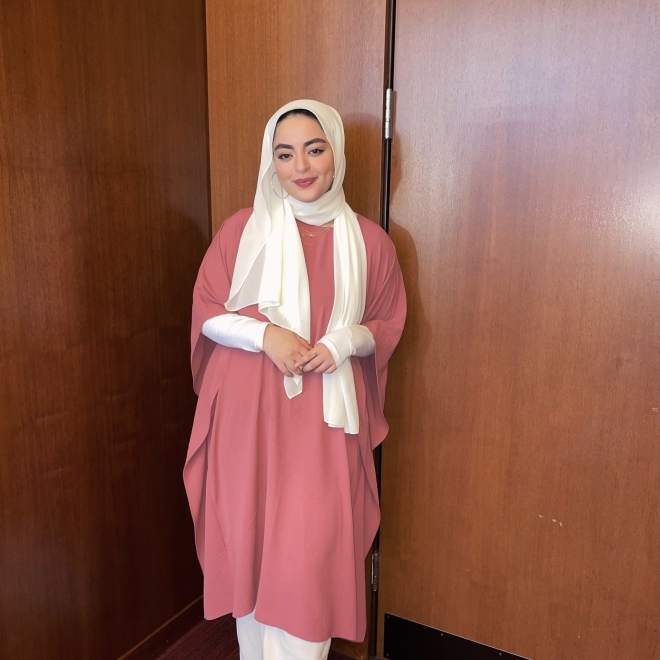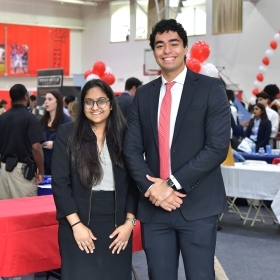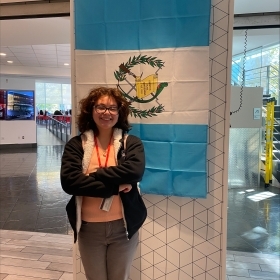Fostering Diversity, Equity, and Inclusion in College: Student Q&A

At a time when promoting and embracing diversity, equity, and inclusion is crucial, Basmalla Hussein, a committed and passionate third-year Muslim student at St. John’s University, has taken charge of creating a positive impact. Drawing upon her high school experiences and a desire to contribute to a cause larger than herself, Basmalla shares her journey in this inspiring Q&A session.
Basmalla is a Student Coordinator in St. John’s Office of Multicultural Affairs (OMA) and participates in their Student Equity Workshops (SEW). These workshops promote cultural awareness, sensitivity, diversity, and social justice at the University. She is pursuing a Doctor of Pharmacy program (Pharm.D.) degree and is expected to graduate in 2027.
I. Motivation for Promoting Diversity and Equity
Q: What motivated you to become involved in promoting diversity and equity on campus?
Basmalla: Since high school, I have been passionate about promoting equity and fostering diversity within the campus environment. I have actively participated in various task forces and served on the Muslim Student Association (MSA) executive board.
When I came across the @StJohnsOma Instagram post announcing recruitment for the Student Equity Workshops through the Office of Multicultural Affairs (OMA), I felt an immediate connection and a desire to contribute to a cause larger than my own.
Q: How has your involvement in study equity initiatives during high school prepared you for your current role?
Basmalla: While in high school, I went to a progressive and liberal school that prioritized significant values like social awareness, diversity, and critical thinking. This atmosphere provided me with the necessary abilities—including critical analysis, empathy, and efficient communication—that have been crucial in my pursuit of promoting equity and inclusivity.
Moreover, my involvement in the Muslim Student Association during high school helped me effortlessly contribute to OMA’s efforts. My diverse roles and identities throughout my academic journey uniquely position me to promote inclusivity and understanding on campus.
II. Role and Contributions as a Student Coordinator
Q: Could you describe your student coordinator role at OMA and how you contribute to the Student Equity Workshop (SEW) programs?
Basmalla: My role as a student coordinator revolves around a dynamic combination of leadership, training facilitation, behind-the-scenes coordination, and impactful marketing efforts.
One of my primary roles involves leading facilitations and conducting training sessions. Over the past year, I’ve hosted approximately ten facilitations to promote awareness and understanding of equity-related topics. I’ve also extended my reach beyond St. John’s University’s Queens, NY, campus by conducting virtual training sessions for Resident Assistants at the Rome, Italy, campus and offering training to staff and faculty members.
In addition to my direct involvement in facilitating discussions and training, I also play a significant role in the program’s organizational aspects. I collaborate closely with Lové Johnson, Assistant Director of Social Justice Training and Education, contributing to various behind-the-scenes tasks that ensure the smooth operation of the program. This involves creating engaging and informative event flyers that are subsequently shared on the OMA Instagram account.
III. Impact on Personal and Academic Growth
Q: How has your experience through OMA positively impacted your time at St. John’s University, personally and academically?
Basmalla: Early on, our role involved completing a series of diversity, equity, and inclusion training sessions, which allowed me to observe skilled trainers and learn effective presentation techniques. Lové Johnson, our mentor, consistently highlighted my strengths and areas for improvement. In the past, I often diffused tense situations with humor, but the experience of leading multiple facilitation in diverse settings has refined my presentation and communication abilities.
Academically, OMA involvement has kept me informed about global news, directly benefiting courses such as pharmacoeconomics and social aspects of pharmacy practice. Many topics covered in these classes demand an awareness of cultural biases and current events.
Q: Can you share some of your most fulfilling experiences working on the St. John’s OMA team?
Basmalla: Some of the most fulfilling moments I’ve had while working on the OMA team have been when I completed a facilitation series spanning several months with the same group of participants. It’s incredibly gratifying to hear their appreciation for our time together and how much they’ve learned from the experience.
Another was helping plan a Muslim bias training event with the New York City Commission on Human Rights. I collaborated with the Muslim Student Association and was proud to contribute my efforts to an organization I am deeply involved in. The training was accurate and thoughtful, highlighting the importance of educating non-Muslims. Working on initiatives like this is truly meaningful, and the connections and collaborations from it are invaluable. All the effort and dedication put into these events is well worth it.
IV. Future Aspirations and Skills
Q: As you look forward to pursuing a graduate program, how do you envision the skills and experiences you’ve gained in your current role benefiting your future endeavors?
Basmalla: I am excited to pursue a Doctor of Pharmacy (Pharm.D.). My current role in OMA has equipped me with valuable skills and experiences that will benefit my future endeavors. I am particularly interested in the industry pharmacy sector, which focuses on the corporate and research aspects of the pharmaceutical field. My goal is to become a Diversity and Equity Coordinator in a major pharmaceutical company such as Pfizer Inc. or Merck & Co., Inc.—and my present experience will be an asset for achieving my desired career path.
Over the past two years, I have been actively exploring and identifying my passions. Continuing and expanding this meaningful work on a larger scale, especially within the pharmacy industry, greatly appeals to me and aligns with my aspirations.
V. Student Advice
Q: Managing your studies in Pharmacy and extracurricular activities can be challenging. How do you balance your time effectively to ensure success in both areas?
Basmalla: Having Lové as a mentor has been highly beneficial. Her flexibility and approachability have been invaluable to me. Whenever I feel overwhelmed with my coursework, I can always contact her. She is understanding and accommodating, whether it’s granting me more time or lightening my workload.
In addition, the ability to set my office hours at the Office of Multicultural Affairs has dramatically transformed how I manage my commitments. This independence allows me to optimize my time allocation and balance my academic obligations and extracurricular responsibilities.
Do you have any advice for fellow students who want to participate in similar initiatives or make a positive impact during their college years?
Basmalla: If you’re a student looking to make a difference and leave a positive impact during your college years, I suggest getting involved in the vibrant student life on campus. This is a great way to build connections, expand your network, and contribute to important causes. Even if your school doesn’t have an Office of Multicultural Affairs, many student groups prioritize diversity and equity in their mission.
Based on my experience, dedicating myself to purpose-driven endeavors was incredibly fulfilling during my college journey. Focusing on more than just academics and getting involved in meaningful activities helped shape a well-rounded and rewarding college experience.
Selecting a campus that values diversity can provide numerous advantages during college and future professional endeavors.
Read our latest blog on “Diversity: 5 Ways it Boosts Student Success.”






